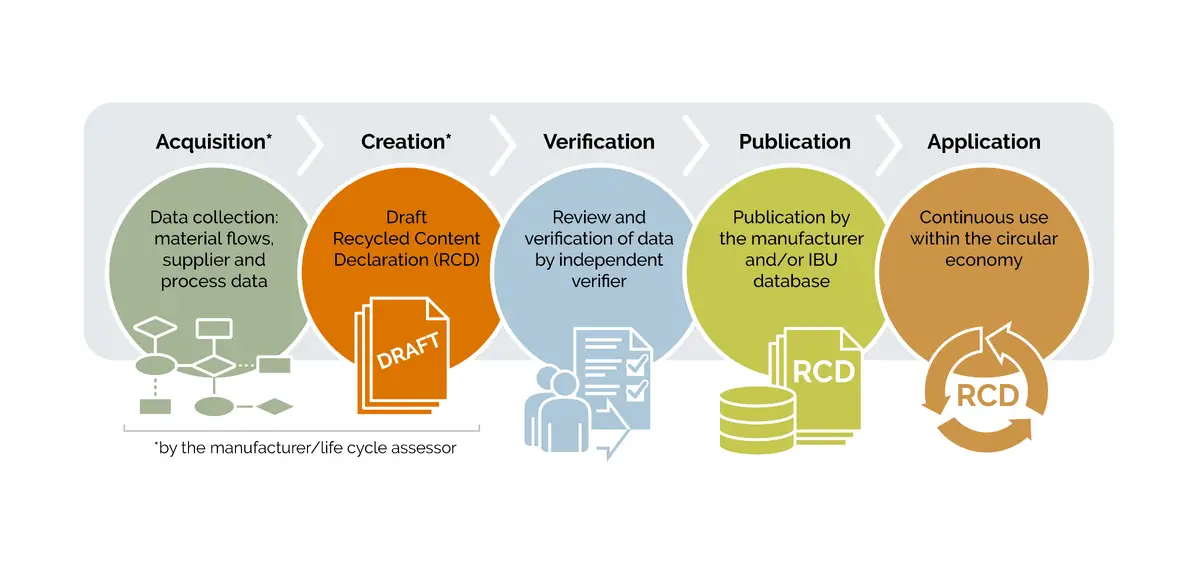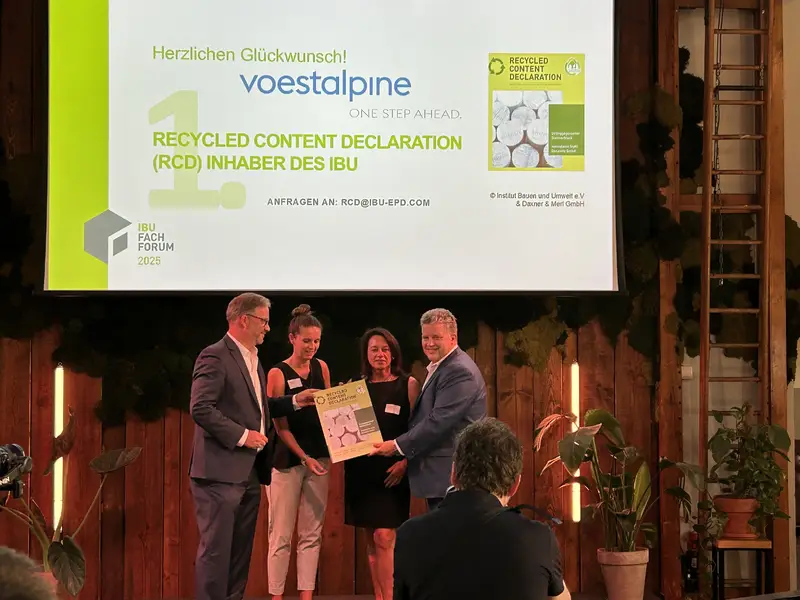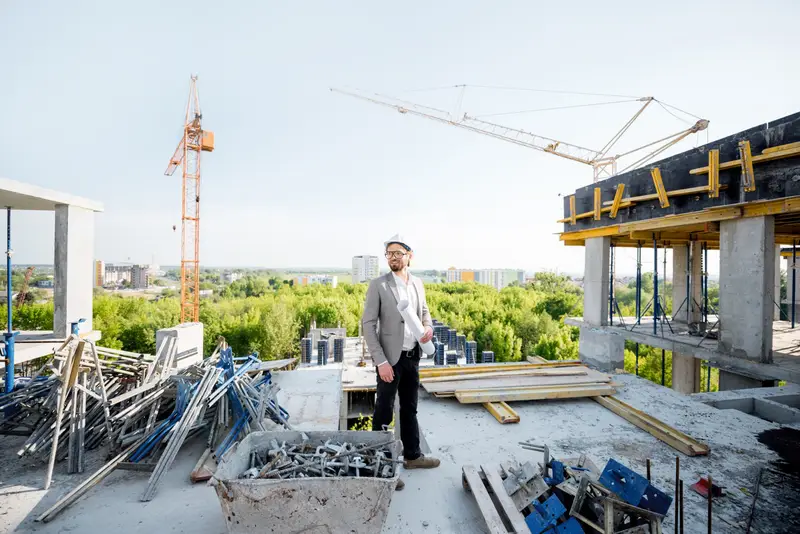Maximise resource efficiency
Recycled Content Declaration (RCD)
The Recycled Content Declaration (RCD) is a voluntary manufacturer's declaration that documents the recycled content in construction products - verified, traceable and compliant with standards.
What is an RCD?
An RCD is a verified manufacturer's declaration that transparently states the proportion of recycled materials in construction products.
The RCD provides reliable and well-founded information. It ensures transparency in circular construction and thus actively contributes to the conservation of natural resources. It is to be understood as a supplement to an EPD or as an independent declaration.
The steps to the RCD
The path to the RCD is clearly structured. Firstly, the manufacturer commissions the preparation of the life cycle assessment and provides the necessary data, for example on material flows and processes, for an observation period of one year. On this basis, an RCD report is created with calculations and evidence. This is followed by independent verification. An EPD is not a prerequisite, but can be combined with the RCD to maximise transparency.

1st IBU-RCD owner
Pilot Project voestalpine Stahl Donawitz GmbH
On 1 July 2025, the IBU handed over the first verified RCD to voestalpine Stahl Donawitz GmbH.
„With the first IBU Recycled Content Declaration, we are sending out a strong signal in favour of transparency and responsibility. In times of changing legal framework conditions, it is crucial not only to react, but to think ahead. Customers rely on clear, comprehensible information - and we deliver it. Sustainability starts with disclosure. Those who communicate openly today create trust for tomorrow. Voestalpine is consciously taking a step ahead here - one step ahead," says Anita Brandl, voestalpine Stahl Donawitz GmbH.

Who is the RCD relevant for?
RCDs support the circular economy along the entire value chain.

Manufacturer/ Life Cycle Assessor
Competitive advantage in tenders: Public contracting authorities.
Transparent market communication: Supply chain partners, planners and builders receive reliable key figures instead of general sustainability promises.
Social contribution: Manufacturers promote circular economy and resource efficiency.
Flexible use: Can be used independently or in combination with an EPD for even greater significance.

Architects and planners
Reliable planning assistance to meet the sustainability requirements of private and public building contractors.
Reliable figures: material ecology certificates for circular construction.
Easy handling in the planning process: digital, machine-readable data sets.

Public contracting authorities
Establishment of binding criteria for public tenders.
Delivery of standard-compliant figures in line with the circular economy.

Building owners and investors
Conserving raw materials: Secondary raw materials reduce the strain on natural resources such as sand, gravel and metals.
Reducing waste volumes: Recycling avoids landfill costs and closes material cycles.
Reducing energy consumption: Recycling processes often require significantly less primary energy than the extraction of new raw materials.
Promoting regional value creation: Recycling and processing plants create local jobs.
Achieving climate targets: Less primary material and lower energy consumption contribute measurably to CO₂ reduction.
Price model
How much does an RCD cost?
RCD WITHOUT simultaneous EPD submission : 2,500 EUR
Price for IBU Members: 2,000 EUR (-20%)
RCD WITH simultaneous EPD submission: 1,250 EUR
Several RCDs based on the same background data: Costs depend on the specific effort involved, approx.EUR 500 to EUR 700 per additional RCD.
FAQ
Frequently asked questions
- What advantages does the RCD offer?
-
A key advantage of the RCD is its transparency. This transparency requirement was an essential part of the declaration from the ontset in order to ensure its credibility. Another advantage is that established international regulations and standards were used as a basis. This means that the wheel did not have to be reinvented, ensuring broad recognition. These specifications define clear calculation rules that provide a solid foundation for making a reliable claim. This includes providing evidence in relation to customer requirements and support with building certification.
- What standards is the RCD based on?
-
The most important core standard of the RCD is ISO 14021, which also includes the definition of the recycling content. This means that all requirements specified therein are also taken into account. ISO 14021 leaves a little room for interpretation, which is why we have included EN45557 accordingly. This contains many useful additional requirements, for example in the area of the circular economy. The requirements of the new ISO 59020 series of standards have also been taken into account.
- What is the difference between EPD and RCD?
-
An environmental product declaration (EPD) provides comprehensive information about all the environmental properties of a construction product throughout its entire life cycle. Until now, this has also included information about recycling, but only to a very limited extent. In addition, there are very few truly verifiable and comprehensible rules in this area. Our goal was to eliminate this deficit, as building product manufacturers are placing increasing demands on the specific recycling content of their products. In order to meet these requirements, we have developed an additional certificate as proof of the recycling content. An RCD can also be created without an EPD. In this case, the relevant background data must be recorded and verified. A significant advantage is that costs are reduced if an RCD is applied for and submitted to the Institut Bauen und Umwelt e.V. at the same time as an EPD.
- Do I need an EPD to obtain an RCD?
-
No. An RCD can be created independently of an EPD. However, a combination offers maximum transparency.
- How much does an RCD cost?
-
RCD WITHOUT simultaneous EPD submission: EUR 2,500, member price EUR 2,000 (-20%). RCD WITH simultaneous EPD submission: EUR 1,250. Multiple RCDs based on the same background data: Costs are based on actual expenditure, approx. EUR 500 to EUR 700 per additional RCD. Terms and conditions: Prices are net, plus statutory VAT. Member discount (-20%) only applies to IBU member companies or companies that have the same rights through group or association membership. Additional RCDs based on the same background data will be charged according to the actual effort involved. For more than ten RCDs, please contact us individually. Valid until further notice; subject to adjustments in the event of changes to methodology/processes.
- Will proof of the recycled content be mandatory in the amended Construction Products Regulation from 2026 onwards?
-
There are no blanket instructions (yet). Specific minimum requirements – for example, regarding recycled content or recyclability – may be laid down in future by delegated acts of the European Commission for individual product groups. The regulation creates, for the first time, a binding legal framework for systematically taking environmental aspects into account in construction products, without, however, stipulating general quotas or obligations.
Find out more now!
Would you like to create an RCD or do you have questions about the application? The IBU team will be happy to advise you.
- Address
-
Institut Bauen und Umwelt e.V.
Hegelplatz 1
10117 Berlin - Telephone
- +49 30 30 87 74 80
- rcd@ibu-epd.com
